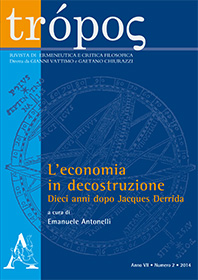Estratto da
TRóPOS
L’economia in decostruzione. Dieci anni dopo Jacques Derrida
The Problem of Sharing Language. Davidson in a Gadamerian Perspective
TRóPOS
L’economia in decostruzione. Dieci anni dopo Jacques Derrida
The Problem of Sharing Language. Davidson in a Gadamerian Perspective

Abstract
This paper examines the possible convergences between Gadamer and Davidson regarding the problem of common language needed for mutual understanding by reassessing the source of their difference. It begins with Davidson’s estimation, according to which he agrees largely with Gadamer’s views on language, understanding and communication except for his thesis that communication presupposes sharing language. My analysis of this observation results with the conclusion that the main difference between these two philosophers lies in their understanding of language in general: for Gadamer language is not only a way of communicating meanings as in Davidson’s work, but also it is a bearer of tradition. This text shows how serious appreciation of this dimension of having–language influences the conditions for a dialogue that according to Gadamer are to be found also in the tradition, which is disclosed in language that we learn by learning about world. But the main contribution of the present text consists of its attempt to specify Gadamer’s idea of tradition’s agency through language by means of Davidson’s terms of “prior” and “passing” theories by offering a new account on their relation.
Keywords: common (sharing) language, prior/passing theories, dialogue, tradition, world–disclosing
This paper examines the possible convergences between Gadamer and Davidson regarding the problem of common language needed for mutual understanding by reassessing the source of their difference. It begins with Davidson’s estimation, according to which he agrees largely with Gadamer’s views on language, understanding and communication except for his thesis that communication presupposes sharing language. My analysis of this observation results with the conclusion that the main difference between these two philosophers lies in their understanding of language in general: for Gadamer language is not only a way of communicating meanings as in Davidson’s work, but also it is a bearer of tradition. This text shows how serious appreciation of this dimension of having–language influences the conditions for a dialogue that according to Gadamer are to be found also in the tradition, which is disclosed in language that we learn by learning about world. But the main contribution of the present text consists of its attempt to specify Gadamer’s idea of tradition’s agency through language by means of Davidson’s terms of “prior” and “passing” theories by offering a new account on their relation.
Keywords: common (sharing) language, prior/passing theories, dialogue, tradition, world–disclosing
| pagine: | 137-150 |
| DOI: | 10.4399/97888548797209 |
| data pubblicazione: | Dicembre 2014 |
| editore: | Aracne |








